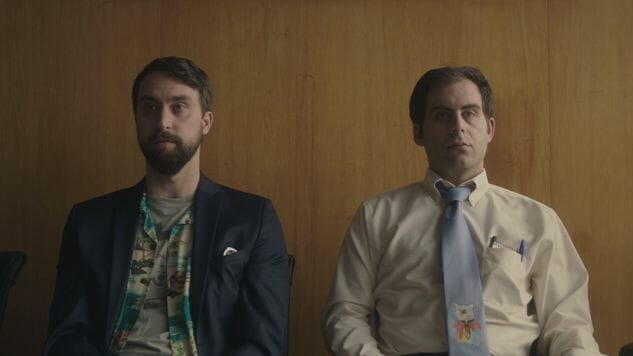The Relatable Existential Dread of Comedy Central’s Corporate
Mobile lead image by Chris Buck, both photos courtesy Comedy Central
It was recently reported in the millennial paper of record, Buzzfeed, that millennials are the burnout generation: people in their 20s and 30s were raised to be over-achieving, ladder-climbing, do-everything perfectionists and, as a result, are now dead-inside, exhausted, ambition-peaked desk warmers who can’t get it together to go to the supermarket (shout out to my Amazon Fresh subscription).
If millennials are the burnout generation, then Comedy Central’s Corporate, which premieres its second season on Jan. 15, is their megaphone. Set at the fictional company Hampton DeVille, a capitalist mecca of power and greed that seemingly sucks the souls out of its employees through its fluorescent lighting and mandated corporate retreats, the series is created by Pat Bishop, Matt Ingebretson and Jake Weisman and stars the latter two as the mid-level managers Matt and Jake. Crammed knee-to-knee in a fishbowl of an office, they are forever running on the proverbial hamster wheel that is corporate America.
“Part of the philosophy of the show is that work is an existential hell,” Weisman deadpans when we talked on the phone in December.
Ingebretson goes so far as to compare it to No Exit, the Jean-Paul Sartre play where three characters who drive each other nuts are stuck together in one room for eternity. As someone who has considered jamming a pen in her thigh to get out of a staff meeting and who once hallucinated that a company’s walls were literally closing in on her, I am here for it.
In the Corporate world, the characters’ conversations are almost entirely superfluous and center mostly around either the latest binge-watch obsession or their relationships to their fellow co-workers and bosses. This season, an episode mocks the office crushes that tend to happen purely because of desk proximity and that so often go unrequited because no one thinks to actually strike up a real, meaningful conversation. Perhaps even more relatable is an episode where Aparna Nancherla’s otherwise even-keeled HR director Grace is ready to start a manhunt to find the sick bastard who is hoarding the pink (and clearly the best) Starburst from the break room’s candy jar.
Why such over-exaggerated phoniness and obsession with the inconsequential? Because these are probably the only safe things to talk about at work.
“So many crazy and wild things are happening in corporate offices, but the only way that you’re allowed to relate to each other is by talking about the TV show you watched,” Ingebretson says. “While your company might be dealing with the product recall that killed 1,000 people, you’re not going to be talking about that in the break room.”
While the creators make a point of not putting any official stamp on when their show takes place, there are some indicators as to just how well it reflects the masculine-driven workplace climate that’s especially been under the media’s microscope over the past year. This season, there’s a story centered around the old boy’s club locker room talk that’s only really penetrable if you’re married (and, probably, a man). Another covers the accepted sexism that the only way a highly qualified woman like Anne Dudek’s Kate can get ahead is if she flirts or speaks like a child—advice bestowed on her by the one person who really shouldn’t be put in this position, Nancherla’s human resources head.
The series creators have made a point of hiring a gender-balanced writers’ room for both seasons, with Weisman saying that “it’s important that we speak to gender inequity and how that is affecting the corporate environment, but not in a pandering way.”
Even the double-standards of beauty are addressed in an episode this year where the guys try to make male makeup happen (mascara really brings out Ingebretson’s eyes). Weisman, who does sometimes wear makeup, says frankly “it’s weird that we’re telling [women] they have to wear makeup or they look ugly” but we don’t put the same pressures on men. He, and the show, argue that it would totally work if we did because “men are so insecure that it’s fucking everything up because they’re not in touch with their feelings.”
-

-

-

-

-

-

-

-

-

-

-

-

-

-

-

-

-

-

-

-

-

-

-

-

-

-

-

-

-

-

-

-

-

-

-

-

-

-

-

-








































